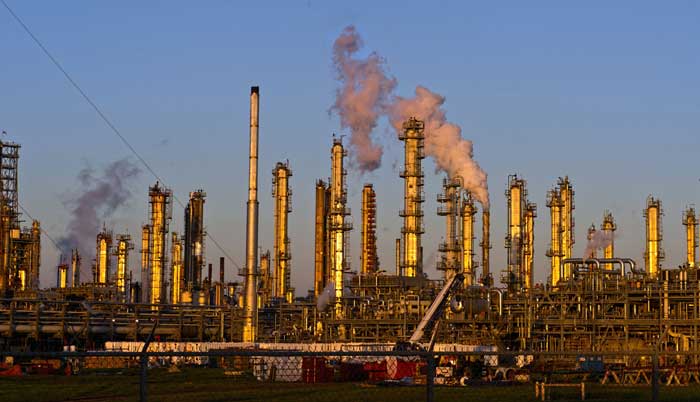![]() Home > World Business
Home > World Business
A $6 Billion Windfall For Oil Refiners Has Small Hurdle: The IRS

Photographer: Eddie Seal/Bloomberg
![]() November 7th, 2017 | 11:02 AM |
November 7th, 2017 | 11:02 AM | ![]() 886 views
886 views
WORLD
An obscure gasoline additive could lead to a windfall of more than $6 billion for struggling U.S. oil refiners. There’s just one hurdle: the Internal Revenue Service.
Fuel makers are examining whether their occasional use of butane -- a liquefied petroleum gas -- qualifies for a big tax credit under a now-expired law that was intended to promote the use of cleaner-burning fuels sold at the pump. Refiners usually add butane to gasoline during winter months to help comply with government limits on smog-causing emissions.
LPGs such as butane, propane and ethane were defined as alternative fuels under the 2008 law, which means a credit of 50 cents a gallon is still available for anyone who used them as additives from October 2014 until the law expired at the end of last year, according to an analysis by Houston-based tax attorneys Shawn R. O’Brien and May Y. Chow at Mayer Brown LLP. U.S. refiners mix about 6 billion gallons (142 million barrels) of butane in gasoline annually.
While the industry and even some IRS guidelines identify butane as an LPG, the agency has indicated that the definition shouldn’t apply under the alternative-fuel-mixture credit. The IRS is reviewing the matter and seeking public comment before issuing a final ruling. For an industry that saw profits tumble more than 60 percent last year, claiming the credit is something refiners should consider, even before the IRS ruling, O’Brien said.
“There’s a way to construct the argument that you’re entitled to this credit if you mix butane,” O’Brien said by telephone. “And because that’s a common mixture, people in the industry are looking at it as a huge opportunity.”
A spokeswoman for the IRS in Washington declined to comment. Whether butane can be claimed for a fuel-mixing credit by refiners is among the long list of tax-related questions the agency aims to clarify over the next year, according to its Oct. 20 priority guidance plan for 2017-18.
Butane accounts for about 4 percent of what Americans put in their gas tanks every year, said Andy Lipow, president of Lipow Oil Associates in Houston. By comparison, corn-based ethanol is 10 percent, according to the Energy Information Administration. Butane is often cheaper and helps meet smog standards for fuels sold in winter, when different mixtures may be required because of cold weather.
Mostly derived from natural gas, butane also can be extracted from crude oil in the refining process. The gas can easily be converted to a liquid. While U.S. natural-gas production has almost doubled since 2000, demand hasn’t risen fast enough to keep pace, resulting in a prolonged glut and low prices.
During the past two years, refiners have seen their costs rise, including for butane. U.S. butane producers are shipping more overseas and sometimes limit supplies available to domestic users. Butane prices are up 49 percent since the end of June, the biggest pre-winter run-up in at least a decade.
Refiners contacted by Bloomberg declined to comment, including Marathon Petroleum Corp., Exxon Mobil Corp. and Phillips 66, as did the American Petroleum Institute, an industry group. Valero Energy Corp., the largest U.S. refiner, and Chevron Corp. didn’t respond to requests for comment.
Congressional Intent
Applying for the credit is no guarantee of success. Sunoco Inc., a gasoline marketer and wholesaler that runs filling stations and convenience stories, tried to recover $300 million in refunds last year for mixing ethanol with its fuel. The U.S. Court of Federal Claims favored the government in a November 2016 order, saying Sunoco’s interpretation “would result in a windfall that Congress did not intend.”
Still, with fuel margins tight, the industry may consider testing the IRS on the butane credit.
“There’s no way refiners and blenders would leave money like that on the table,” said Mason Hamilton, an analyst with the U.S. Energy Information Administration.
Source:
courtesy of BLOOMBERG
by Laura Blewitt
If you have any stories or news that you would like to share with the global online community, please feel free to share it with us by contacting us directly at [email protected]